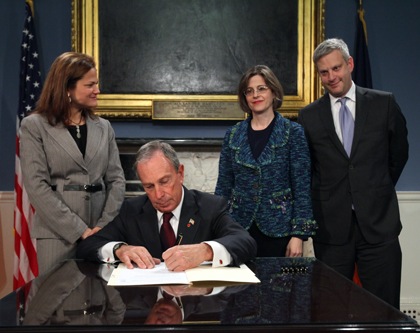
Bloomberg administration officials have now twice appeared in front of the City Council to oppose legislation requiring that the city post up-to-date information about traffic crashes and summonses online. In April, the NYPD testified that such a reporting requirement would be a burden on the department and that the public couldn't interpret that kind of information. And last week the DOT argued that it wasn't the right agency to release such information.
But the Bloomberg administration isn't always opposed to tracking and reporting police data. On Monday, the mayor signed into law two bills that will release information about hate crimes and domestic violence. Intros 373 and 393 require the Mayor's Office of Operations to centralize this data on the city's My Neighborhood Statistics website. "The two bills before me today increase transparency," said Bloomberg at the bill signing.
"To not have this information available to the public would mean keeping our residents in the dark," Council Speaker Christine Quinn said of the legislation, according to a DNAinfo report. "Any additional data to help understand and fight both hate crimes and domestic violence will be beneficial to individual neighborhoods and the City as a whole."
With Bloomberg and Quinn squarely on board, both bills flew through the legislative process. They were introduced to the Council on October 13; hearings, votes, and the bill signing took less than a month.
While the specifics differ, the principle behind those bills is the same idea underpinning Intro 370, Council Member Jessica Lappin's bill to release TrafficStat data about the location and cause of traffic crashes and data on traffic enforcement summonses. New Yorkers not only deserve to know about crime in their city, but they should be able to use that information to advocate for change. So why is the administration trying to keep traffic crime information hidden even as it celebrates the release of information about hate crime and domestic violence?
Perhaps the problem is that when it comes to traffic enforcement, the city isn't eager to see sunlight shine on its record.
Take, for example, the recent Daily News exposé of traffic enforcement quotas in Brooklyn's 77th Precinct. Documents portray a directive to issue summonses for six offenses: cell phone use, failure to wear seatbelts, double parking, stopping in a bus stop, tinted windows, and operating trucks off of designated routes. In contrast, the DOT's recent pedestrian safety report found that the top three contributing factors in serious crashes involving pedestrians were driver inattention, failure to yield, and speeding. There's not a lot of overlap between those two lists.
That means that in at least one precinct, the NYPD is not deploying its traffic resources to target offenses that cause the most harm on city streets.
Releasing data on traffic crashes and summonses would greatly increase the transparency of efforts to reduce deadly driving and make it easier to hold NYPD accountable for its performance. But it seems to be the one type of information about neighborhood safety that the Bloomberg administration wants to hide from public view.





